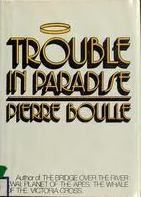This is part of a series on French author Pierre Boulle.
 Julliard, 1979
Julliard, 1979
translated by Patricia Wolf
Vanguard Press, 1985
188 pages
I’m not really sure what I just read, but I’ll do my best to write about it.
You know how I’ve been saying on twitter (@Rcordas) that Boulle’s work is wild? Well, Trouble in Paradise makes the rest of his stuff look tame. That’s the first thing.
Second thing: if you’re reading this review and you’re an observant [insert religion here], you might be horrified and insulted by this book. Like, really insulted. If Boulle hadn’t already stopped being a practicing Catholic by the time he wrote Trouble, he likely would have been asked to leave the religion and never come back.
Don’t think, though, that there’s anything lewd or whatever in the story–it deals almost strictly with theological questions. And if you’re like “wow that sounds REALLY boring,” believe me, it’s anything but. In a nutshell: the Holy Spirit and the Virgin Mary come down to Earth in order to see what they can do about resolving the intense dispute between God and Jesus in Heaven. And then things get…complicated.
Let’s begin with the seance, which opens the book (you read that right). A high-society lady, the president of France, an astrophysicist, a priest, and a reverend are all dabbling in some psychic research for fun. This was really a thing in the late-nineteenth century in some Western countries. Anyway, they manage to summon none other than the Holy Spirit (who takes up residence in the astrophysicist’s body) and the Virgin Mary herself, who sits politely in a chair and learns French in about three seconds.
As Mary and the Holy Spirit explain to the shocked seance participants, stuff’s been going down in Heaven. The shift over the centuries on Earth away from focusing on God to elevating Jesus has made God resentful and Jesus arrogant. Mary and the Holy Spirit have been caught in the middle as Jesus tries to dethrone God (literally- God sits on this cool throne and Jesus wants to sit on it instead).
The group hatches a plan to influence the Catholic Church in France (and potentially worldwide) to clarify that the Trinity is composed of three equally-important figures. Mary, whom people fall in love with instantly, is offered a government role dealing with women’s issues. She works her way up to President of France and begins to cultivate an even more devoted group of followers. Meanwhile, the Holy Spirit intervenes here and there to help Mary on Earth and to try and settle the argument between God and Jesus in Heaven. As the Holy Spirit explained earlier, what happens on Earth has influenced the hierarchy in Heaven for many centuries, so as Mary’s popularity increases with humanity, it also rises with the angels. The astrophysicist even influences the Holy Spirit, such that the latter embarks upon a course on the planets, stars, and other cosmic phenomena. And then Mary starts to wonder, if she’s called the “Mother of God,” why she isn’t sitting on that cool throne….
As in The Good Leviathan, Boulle brings up the writings of real-life French Jesuit priest, scientist, and paleontologist Pierre Teilhard de Chardin, who blended science and Christianity in his writings and earned the resentment of some of his colleagues. At a salon in which multiple religious leaders are brought together to discuss the nature of God, the Holy Spirit (in the body of the astrophysicist) explains what he thinks about reconciling Christianity and evolution:
The synthesizing effort in Teilhard’s work impressed me as a splendid artistic production that deserves applause. To succeed by talent, by artistry–there’s no other word for it–in juxtaposing two such contradictory currents of thought as Christianity and the science of evolution; to give a reasonable appearance of logic to a single theory combining the rational and the irrational, discipline and dream: this is an intellectual masterpiece, the product of a mind that strains and twists as it seeks out the impossible answer to a preposterous problem and winds up creating this patchwork solution in a flash of genius. A feat similar to, but even more prodigious than the association in one God of two persons as unlike as the Father and the Son. Marvelous synthesis indeed, but chiefly a literary monument…. (100)
Trouble in Paradise is not so much an exploration of a theological question (the nature of the Trinity) but instead an attempt at shifting perspective when it comes to humans and spiritual beliefs. Here, Boulle transforms the figures of God, Jesus, the Holy Spirit, Mary, and the angels into something akin to the bickering, resentful, and vengeful Greek gods. In other words, Boulle humanizes these figures and imagines how humankind might influence them, rather than the other way around. In this way, Boulle isn’t necessarily trying to offend but simply to take things (as he does) to what he thinks are their logical conclusions.
We’ve already seen Boulle tackle religious questions in his absurdist, ironic way in The Good Leviathan, “When the Serpent Failed,” “The Holy Places,” and “The Miracle.” Astrophysicists appear in some of these stories, usually to explain that mid-twentieth century physics has wrapped back around from the natural world to larger cosmic questions. The micro- and macro-universe push scientists to think beyond the confines of Earthly phenomena in order to find an explanation for the cosmos itself.
Trouble in Paradise is just under 200 pages and quite the entertaining read, so go read it. It’s wild.
